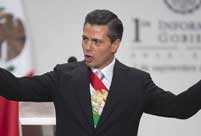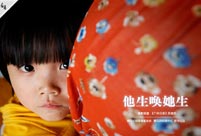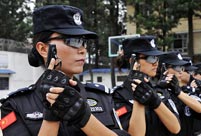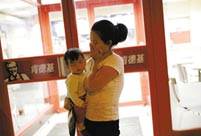 China's new-type guided missile frigate 'Bengbu' in live fire training
China's new-type guided missile frigate 'Bengbu' in live fire training
 China’s weekly story (2013.8.10 - 8.23)
China’s weekly story (2013.8.10 - 8.23)
 Flight team performs first show abroad
Flight team performs first show abroad
 With parents bedridden, 12-year-old boy becomes pillar of the family
With parents bedridden, 12-year-old boy becomes pillar of the family
 Top 10 private Chinese enterprises 2013
Top 10 private Chinese enterprises 2013
 The most gorgeous Chinese women in the eyes of foreigners
The most gorgeous Chinese women in the eyes of foreigners
Beijing will reduce car registrations from next year in a bid to clean up its air and ease traffic congestion, local transport authorities said Tuesday.
Rong Jun, a spokesman for the municipal transport commission, said the commission is working with several other government agencies on a new monthly limit on car registrations for the next few years.
The new limit will be announced in late November and be effective in 2014, Rong told a press briefing.
According to a five-year clean air action plan (2013-2017) released Monday, the total number of vehicles in the city will be restricted to around 6 million by the end of 2017.
The city had 5.35 million vehicles at the end of July, according to figures from the Beijing Traffic Management Bureau.
Beijing started to cap the number of new cars that could be registered annually in 2011 to 240,000, about one-third of the number registered in 2010. Potential car buyers are required to participate in a license plate lottery.
In August, the municipal transport commission received about 1.6 million new car license applications. One out of 80 applicants got car purchase permits as only 20,000 new license plates are now issued each month.
The limit has drawn complaints from many residents due to the slim chance of getting a car plate and a further cut could trigger more backlash.
"More than two years have passed, I still haven't won a plate in the lottery. With a decline in car registrations in sight, my chance of getting one will become slimmer," said Beijing resident Wang Yang.
"There is no problem with controlling the total amount as all drivers benefit from less busy roads," said lawyer Liu Jiahui. "But the authorities should spend big on public transport to make it more convenient."
Vehicles in the city are considered a major contributor to Beijing's smoggy skies in recent years.
A report by a research team from the Chinese Academy of Sciences revealed that vehicle exhaust fumes are among Beijing's top sources of air pollution, contributing to 22.2 percent of PM2.5 particles in the city, exceeding the figure for industrial emissions.
The greater intensity of car use over the past years has made vehicle exhaust fume pollution more severe and roads more crowded, the official said.
Rong also said the authorities will study potential effects of congestion fees for cars and seek feedback from all walks of life before coming up with a final plan.
According to the action plan, the municipal government should formulate market policies to increase the cost of car use, including setting up low emission zones and congestion fees.
He said that such policies in international metropolis like London, Singapore and Milan have had the desired effects of curbing air pollution and easing traffic jams.
Currently, cars in Beijing are banned from roads for one workday a week. Further measures to reduce car use include improvement of the city's public transport system and building a comprehensive public bicycle rental system by 2017.
"In a bid to reduce vehicle use, the city should build more subways," said Jia Xinguang, chief analyst with China Automotive Industry Consulting and Development Co..
"Beijing has a big gap with some international metropolises. In Tokyo, for example, subways are responsible for 80 percent of total trips made in the city," Jia said.
 Mexican president delivers first State of Nation address
Mexican president delivers first State of Nation address Highlights of MAKS 2013 Int'l Aviation and Space Show
Highlights of MAKS 2013 Int'l Aviation and Space Show  10th China-ASEAN Expo opens in Nanning
10th China-ASEAN Expo opens in Nanning Baby born to save his sister - the story of a savior sibling
Baby born to save his sister - the story of a savior sibling Lady of mystery: Female SWAT team in prison disclosed
Lady of mystery: Female SWAT team in prison disclosed  Single mother, baby live in KFC restaurant for months
Single mother, baby live in KFC restaurant for months Fan Bingbing poses for Malaysian magazine Citta Bella
Fan Bingbing poses for Malaysian magazine Citta Bella Zhang Xinyi covers COSMOPOLITAN
Zhang Xinyi covers COSMOPOLITAN A collection of bizarre rooftop buildings around China
A collection of bizarre rooftop buildings around China Putin intimate contacts with marine animals
Putin intimate contacts with marine animals China's frigate 'Bengbu'in fire training
China's frigate 'Bengbu'in fire training Fresh students 'forced' to register in university independently
Fresh students 'forced' to register in university independently 2013 Taiwan Int'l Tourism Expo kicks off in Taipei
2013 Taiwan Int'l Tourism Expo kicks off in Taipei Photo story: Take a gap year
Photo story: Take a gap year Nokia's Global Headquarters: visiting a declining empire
Nokia's Global Headquarters: visiting a declining empireDay|Week|Month